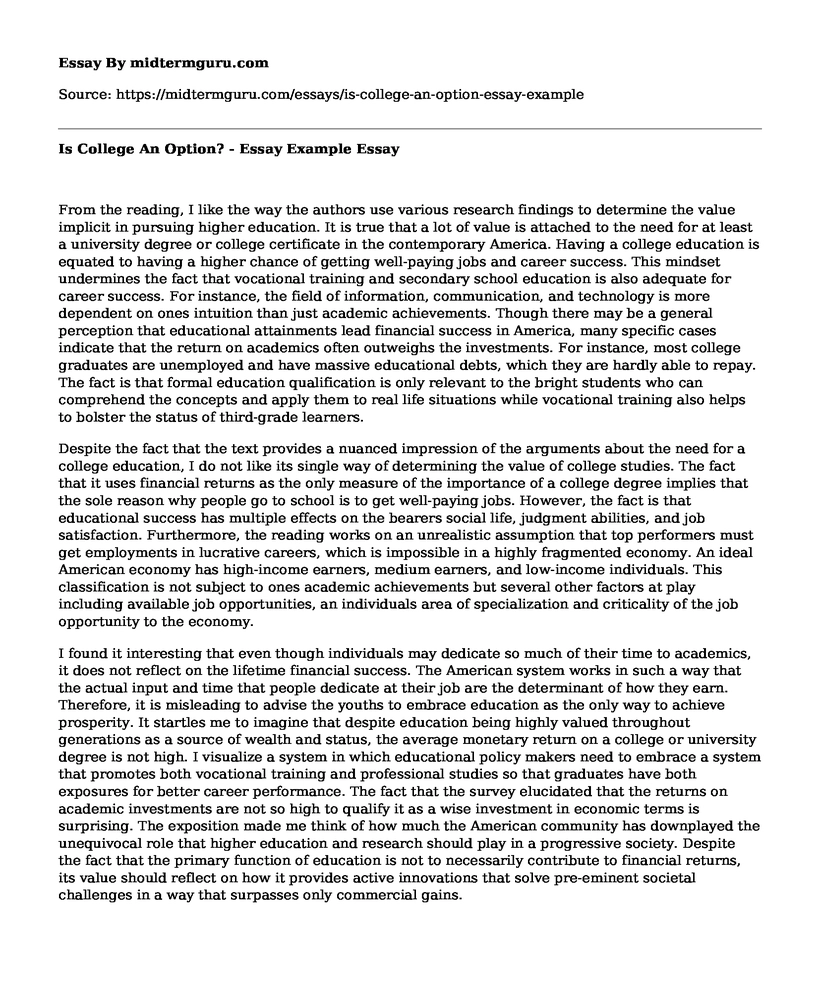From the reading, I like the way the authors use various research findings to determine the value implicit in pursuing higher education. It is true that a lot of value is attached to the need for at least a university degree or college certificate in the contemporary America. Having a college education is equated to having a higher chance of getting well-paying jobs and career success. This mindset undermines the fact that vocational training and secondary school education is also adequate for career success. For instance, the field of information, communication, and technology is more dependent on ones intuition than just academic achievements. Though there may be a general perception that educational attainments lead financial success in America, many specific cases indicate that the return on academics often outweighs the investments. For instance, most college graduates are unemployed and have massive educational debts, which they are hardly able to repay. The fact is that formal education qualification is only relevant to the bright students who can comprehend the concepts and apply them to real life situations while vocational training also helps to bolster the status of third-grade learners.
Despite the fact that the text provides a nuanced impression of the arguments about the need for a college education, I do not like its single way of determining the value of college studies. The fact that it uses financial returns as the only measure of the importance of a college degree implies that the sole reason why people go to school is to get well-paying jobs. However, the fact is that educational success has multiple effects on the bearers social life, judgment abilities, and job satisfaction. Furthermore, the reading works on an unrealistic assumption that top performers must get employments in lucrative careers, which is impossible in a highly fragmented economy. An ideal American economy has high-income earners, medium earners, and low-income individuals. This classification is not subject to ones academic achievements but several other factors at play including available job opportunities, an individuals area of specialization and criticality of the job opportunity to the economy.
I found it interesting that even though individuals may dedicate so much of their time to academics, it does not reflect on the lifetime financial success. The American system works in such a way that the actual input and time that people dedicate at their job are the determinant of how they earn. Therefore, it is misleading to advise the youths to embrace education as the only way to achieve prosperity. It startles me to imagine that despite education being highly valued throughout generations as a source of wealth and status, the average monetary return on a college or university degree is not high. I visualize a system in which educational policy makers need to embrace a system that promotes both vocational training and professional studies so that graduates have both exposures for better career performance. The fact that the survey elucidated that the returns on academic investments are not so high to qualify it as a wise investment in economic terms is surprising. The exposition made me think of how much the American community has downplayed the unequivocal role that higher education and research should play in a progressive society. Despite the fact that the primary function of education is not to necessarily contribute to financial returns, its value should reflect on how it provides active innovations that solve pre-eminent societal challenges in a way that surpasses only commercial gains.
Cite this page
Is College An Option? - Essay Example. (2021, Jun 07). Retrieved from https://midtermguru.com/essays/is-college-an-option-essay-example
If you are the original author of this essay and no longer wish to have it published on the midtermguru.com website, please click below to request its removal:
- Essay on Online vs Traditional Classes
- Essay on Teaching ESL to Afghan Women
- Paper Example on Celebrating Diversity in the Classroom
- Research Paper on Impact of Parental Involvement in Education
- NAEYC Standards in Early Childhood Education and Development - Paper Example
- Parenting Adolescents: Tips to Navigate the Most Challenging Age - Research Paper
- Early Literacy Skills: Essential for Kids' Growth and Adult Empowerment







